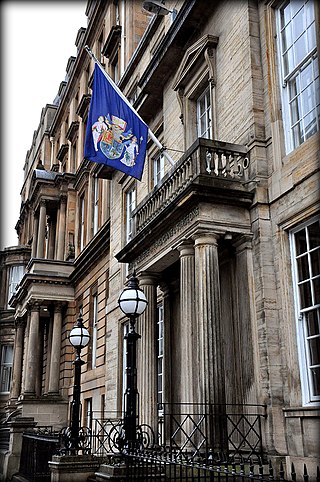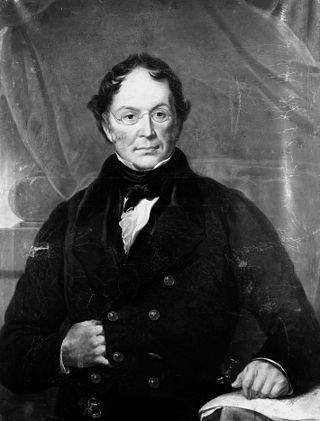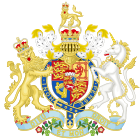
Doctor is an academic title that originates from the Latin word of the same spelling and meaning. The word is originally an agentive noun of the Latin verb docēre[dɔˈkeːrɛ] 'to teach'. It has been used as an academic title in Europe since the 13th century, when the first doctorates were awarded at the University of Bologna and the University of Paris.
A solicitor is a legal practitioner who traditionally deals with most of the legal matters in some jurisdictions. A person must have legally-defined qualifications, which vary from one jurisdiction to another, to be described as a solicitor and enabled to practise there as such. For example, in England and Wales a solicitor is admitted to practise under the provisions of the Solicitors Act 1974. With some exceptions, practising solicitors must possess a practising certificate. There are many more solicitors than barristers in England; they undertake the general aspects of giving legal advice and conducting legal proceedings.

Podiatry, or podiatric medicine, also known as chiropody, is a branch of medicine devoted to the study, diagnosis, and treatment of disorders of the foot, and ankle. The healthcare professional is known as a podiatrist. The US podiatric medical school curriculum includes lower extremity anatomy, general human anatomy, physiology, general medicine, physical assessment, biochemistry, neurobiology, pathophysiology, genetics and embryology, microbiology, histology, pharmacology, women's health, physical rehabilitation, sports medicine, research, ethics and jurisprudence, biomechanics, general principles of orthopedic surgery, and foot and ankle surgery.

Apothecary is an archaic English term for a medical professional who formulates and dispenses materia medica (medicine) to physicians, surgeons, and patients. The modern terms 'pharmacist' and 'chemist' have taken over this role.

The Royal College of Surgeons of Edinburgh (RCSEd) is a professional organisation of surgeons. The College has seven active faculties, covering a broad spectrum of surgical, dental, and other medical practices. Its main campus is located on Nicolson Street, Edinburgh, within the Surgeons' Hall, designed by William Henry Playfair, and adjoining buildings. The main campus includes a skills laboratory, the Surgeons' Hall Museums, a medical and surgical library, and a hotel. A second office was opened in Birmingham (UK) in 2014 and an international office opened in Kuala Lumpur, Malaysia, in 2018.

The Royal College of Physicians and Surgeons of Glasgow is an institute of physicians and surgeons in Glasgow, Scotland.
Operating department practitioners(ODPs) are specialist allied healthcare professionals who are involved in the planning and delivery of perioperative care. They are primarily employed in surgical operating departments but may also work directly within or further their training to facilitate working within a variety of acute clinical settings. These include pre-hospital emergency care, emergency departments, intensive care units (ICUs), endoscopy suites, interventional radiology, cardiac catheter suites, obstetric theatres and reproductive medicine.

John Green Crosse, FRCS, FRS was a well-known English surgeon of his day, at the Norfolk and Norwich Hospital. After completing his apprenticeship in Stowmarket, he studied at St. George's Hospital and at the Windmill Street School of Medicine in London. He then moved to Dublin and Paris, finally settling in Norwich in 1815. In 1823 he became assistant-surgeon to the Norfolk and Norwich Hospital, and in 1826 surgeon. His reputation as a lithotomist, and in 1836 he was elected a Fellow of the Royal Society.

The Medical Act, An Act to Regulate the Qualifications of Practitioners in Medicine and Surgery, also referred to as the Medical Act 1858, was an Act of the Parliament of the United Kingdom which created the General Medical Council to regulate doctors in the UK.

George Man Burrows was an English physician who was an expert on insanity.

Medical regulation ensures that medicine is only practised by qualified and suitable people and can be used to prevent competition and increase financial compensation. The history of regulating doctors in the UK dates back around 600 years. The earliest licensing procedures were administered by the Church, with professional associations and universities also playing a role. Modern regulation of doctors is carried out by the General Medical Council.

John Henderson Hunt, Baron Hunt of Fawley, was a British general practitioner (GP) who, in 1952, co-founded the College of General Practitioners. In 1967 the royal prefix was approved and the college was renamed the Royal College of General Practitioners (RCGP). He became its president in the same year.
The Manchester Royal School of Medicine has its origins in a medical teaching establishment opened on Pine Street, Manchester, England, by Thomas Turner. Established in 1824, the school added the word Royal in 1836 and in 1872 it was taken over by Owens College, which later became a part of the Victoria University of Manchester.

Joseph Jordan, FRCS, was an English surgeon known primarily for his involvement in developing medical education outside its then traditional base of London. He established a medical school in Manchester and was an honorary surgeon of the Manchester Royal Infirmary, as well as a Fellow of the Royal College of Surgeons of England.
James Fernandez Clarke (1812–1876) was an English surgeon and medical writer.

Eliza Walker Dunbar was a Scottish physician and the first woman from the UK to qualify and work as a doctor.

Thomas Turner, FRCS, FLS, was an English surgeon known primarily for his involvement in developing medical education outside its then traditional base of London. He established a medical school in Manchester and was both a Fellow of the Royal College of Surgeons of England and the Linnean Society of London.
The Medical Act 1876 was an act which repealed the previous Medical Act in the United Kingdom and allowed all British medical authorities to license all qualified applicants whatever their gender. It was introduced by Parliament member Russell Gurney. The Act obtained the queen's assent and became law despite Queen Victoria's strong private objections to women's medical training.

Rose v Royal College of Physicians, also known as The Rose Case, was a 1703 British landmark court case between the Royal College of Physicians (RCP) and William Rose, a Liveryman of the Society of Apothecaries. Rose had treated a John Seale, who complained about his treatment to the RCP, who brought a successful court action against Rose in 1703. The Society of Apothecaries and Rose successfully appealed against this judgement. However, this did not change medical practice but merely legitimised what apothecaries were doing already and confirmed the "status quo". It did, nevertheless, symbolize the decline in the College's growing legal monopoly over who practises medicine. The case was ultimately seen as not one between a College and one individual, but one between one powerful College against one powerful Society.
Jonathan Toogood (1784-1870) MRCS 1804, FRCS 1843, LRCP 1844 was a surgeon from the south west of England who founded the Bridgwater Infirmary in Somerset in 1813. He held strong views on many issues of the time, including the role of coroners, the Poor Law Amendment Act 1834, Homeopathy and regulations regarding the sale of arsenic.















